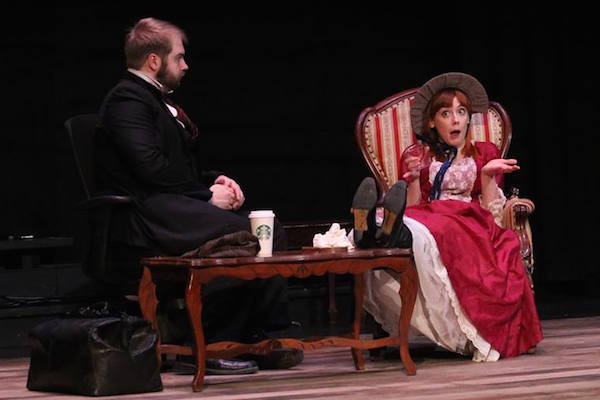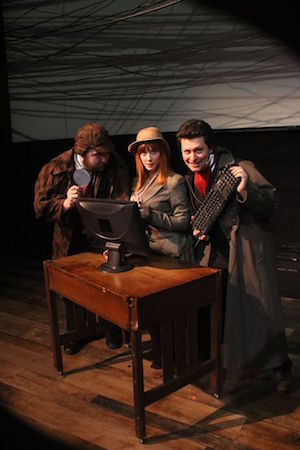
“Only connect!” British author E. M. Forster wrote in his novel A Room With A View. The great societal myth of our age is, with the internet, we are more connected than ever.
In its Canadian premiere at the Highland Arts Theatre this week, Pulitzer Prize winning play The (Curious Case of The) Watson Intelligence by American playwright Madeleine George challenges this connectivity in an age where our entire lives are accessible online even while we live in a frenzy of paranoia (over stalkers, exes and vengeful corporations), de-friending, and anxiously ignoring the urgent voicemail or text from our most recent break-up.
By playing its character arcs through different time periods with variations on its core romantic triangle, Watson Intelligence computes the sum total of our emotional lives and the relationship technology exerts on and, for the most part, fails to resolve on this tangled ball of hot wires.
Eliza is building an Artificial Intelligence companion (with a direct reference to IBM’s Jeopardy-winning supercomputer Big Blue) for the socially disadvantaged to have as an advocate while battling the machinations of Big Government and Big Business. Her ex-husband Merrick, distraught over their divorce and her (imagined) multiple infidelities, is running for City Auditor on a campaign platform combining equal parts of Ayn Rand libertarian soundbites and alt-right “destroy the government to save the government” policies (and remember this play debuted in 2013, before a certain orange-haired billionaire’s candidacy), Merrick hires Josh Watson to follow Eliza to report on what she is doing, but the “Dweeb Team” Watson and Eliza find themselves instantly in love.
George’s exploration of this triangle is shifted through a prism of history and imagination. One thread is played out as a pastiche of a Sherlock Holmes mystery with Eliza as the troubled wife to a paranoid genius inventor, Merrick, and after she is unable to obtain the services of the Baker Street consulting detective, reluctantly accepts the help of his chronicler, Dr. Watson (who on the spot falls for the distressed Eliza).
A second thread includes the reminisces of Alexander Graham Bell’s assistant, another Watson, who during a radio interview (a technology created, like Bell’s telephone, by another part-time Cape Breton resident, Marconi) corrects what it was Bell said to him (along with, for this Watson, its deep emotional context) while explicating the important role of the support staff for the great minds of history.
The device of multiple versions of the three characters uproots the story from its contemporary setting and invests it with a fitting timelessness. Hopefully, in 20 years from now, the human core of the relationships will remain just as urgent, even if the technology has changed. If it sounds complicated, for the audience, the best advice is to keep one’s eye on the “actual” Merrick in each scene.
Tom McGee’s direction used a few set pieces and multiple costume quick changes to convincingly create, in a few deft moves, the ambience of each era. Under a canopy of a profusion of crossed wires (a lovely element from set designer, Bradley Murphy), McGee’s actors move briskly and forcefully through George’s subtle script and dramatically elucidated all of the emotional and philosophical challenges faced by their characters.

Hilary Scott is the right choice for all of the Elizas: she has an innate big-eyed sweetness that makes her instantly sympathetic to audiences, but she has the verve and intelligence to create three assertive, not to be trifled with, female characters. Each of her characters was an especially smart representation of how women had to act towards men in each of their respective eras.
As anyone who remembers his chained stand-up comedian in Punch Up knows, Nicholas Porteous can give an angry rant like nobody else on the HAT stage. But there was an emotional focus to both Merricks (contemporary and Holmesian) that made them oddly sympathetic: both men had brilliant minds and a passion for their ideas, but were almost unhinged by the emotional “blue screen of death” of their lives. In one set piece of transitioning, Merrick the political candidate morphed into Merrick the Victorian Era mechanical genius, and Porteous’ acting was a master class in delineating two men who were joined by a certain male privilege but separated by history and status and class.
Wesley J. Colford brought a quiet assurance to his various Watsons. His AI “Watson” was robotic without being, um, robotic; his “Dweeb” Watson was a likeable schmoo confused by emotional complexities he was too decent to see; his Holmesian Watson could have stepped amiably from the pages of Conan Doyle’s original stories; and his Bell Watson, perhaps the most difficult character because it was the most didactic, had an insistent pride in his place in history that gave the history lesson a humanity.
With its intelligent, assured direction and a dynamic, charismatic, smart team of actors, working their talents on a love story with some precisely timed laughs, the HAT’s production of The (Curious Case of The) Watson Intelligence, should inspire some deep thinking on the part of audiences to connect with not only to the play but to their own lives.
The play is on at the Highland Arts Theatre from Wednesday, April 19 to Sunday, April 23, and again from Thursday, April 27 to Saturday, April 29, at 8 pm nightly.

